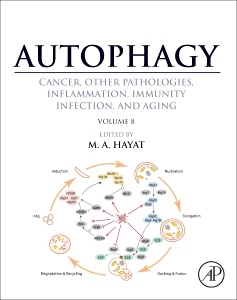Description
Autophagy: Cancer, Other Pathologies, Inflammation, Immunity, Infection, and Aging
Volume 8- Human Diseases
Coordinator: Hayat M. A.
Language: English
Subjects for Autophagy: Cancer, Other Pathologies, Inflammation...:
418 p. · 19x23.3 cm · Hardback
Out of Print
Description
/li>Contents
/li>Biography
/li>Comment
/li>
Volume 8 Autophagy and Human Diseases, concentrates on the role of Autophagy in human diseases, including tumorigenesis. The diseases discussed include melanoma, liver cancer, pancreatic cancer, and neurodegenerative disorders. Loss of autophagy in the central nervous system causes neurodegeneration (Alzheimers disease, Huntington?s disease, Parkin?s disease, and Amyotrophic Lateral Sclerosis). Melanoma is one of the most serious diseases in humans. Autophagy plays a key role in the anticancer response to Chemotherapy. However, autophagy can increase or decrease the effectiveness of chemotherapy. The reasons for these contradictory effects are explained. Autophagy also plays a role in idiopathic inflammatory diseases, infection, and immunity. An explanation is given how autophagy is closely linked to control of innate and adaptive immune responses in host defense in part by regulating cytokine production. The role of autophagy in cutaneous malignant melanoma is discussed in detail and expression of Beclin 1 and LC3 autophagic genes in melanoma is included to explain the molecular mechanisms underlying this very serious disease, which tends to metastasize to the brain. The effect of the treatment of this disease using Terfenadine through the induction of autophagy and apoptosis is also included. Autophagy and apoptosis are two main mechanisms involved in programmed cell death.
1. Autophagy and Human Diseases 2. Role of Autophagy in Clinical Practice 3. Premortem Autophagy Determines the Immunogenicity of Chemotherapy- Induced Cancer Cell Death 4. Suppression of Inflammation and Cancer: Role of Autophagy 5. Immunogenic Cell Death in Cancer Therapy 6. Autophagy-Dependent Anticancer Immune Responses Induced by Chemotherapy 7. Autophagy Inhibition in Cancer Therapy: Role of Antitumor Immunity 8. Autophagy Promotes Tumor Cell Survival and Inhibits Necrosis and Inflammation 9. Autophagy as a Suppressor or Supporter of Tumorigenesis 10. Tumor Growth: Role of Chaperone-Mediated Autophagy 11. A Double-Edged Sword of Autophagy Provided by Chloroquine in Cancer 12. Autophagy suppresses Tumor Activity by Limiting DNA Damage and Chromosomal Instability 13. Autophagy Inhibits Chemosensitivity and Radiosensitivity in Cancer? 14. Autophagy-Deficient Mice Develop Multiple Liver Tumors 15. Pancreatic Tumor Growth: Role of Autophagy 16. Autophagy in cutaneous Malignant Melanoma 17. Prediction of Invasiveness, Resistance to Chemotherapy, and Survival in Melanoma Using measurements of tumor cell Autophagy 18. Expression of Beclin 1 and LC3 Autophagic Genes in Cutaneous Melanocytic Lesions 19. Enhancement of Cell Death in Melanoma: Role of Autophagy and mTOR Pathway 20. Terfenadine Induces Autophagy and Apoptosis in Melanoma Cells
- Presents the most advanced information regarding the role of the autophagic system in life and death and whether autophagy acts fundamentally as a cell survivor, or cell death pathway, or both
- Introduces new, more effective therapeutic strategies, in the development of targeted drugs and programmed cell death, providing information that will aid on preventing detrimental inflammation
- States recent advancements in the molecular mechanisms underlying a large number of genetic and epigenetic diseases and abnormalities




